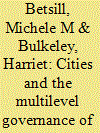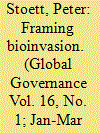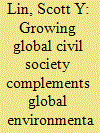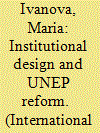|
|
|
Sort Order |
|
|
|
Items / Page
|
|
|
|
|
|
|
| Srl | Item |
| 1 |
ID:
114112


|
|
|
|
|
| Publication |
2012.
|
| Summary/Abstract |
During the last decade, the framing of climate change has been significantly transformed. It has turned from a gradually intensifying, long-term challenge into a highly nonlinear danger that threatens national security. This article explores the reasons, and points to the consequences, of this change. Drawing from actor-network theory, it argues that practices and materials have become entangled across professional and disciplinary contexts. The growing association of chaotic climate change encompasses climatologists, who challenge the mainstream ontology of climate; economists, who started to revisit their economic models; and strategic communities, which began to pick up nonlinear climate changes foregrounding national security. Methodologically, the principle of symmetry that underlies this research aims, as far as is possible, to transcend the dualistic notions of science and politics, and society and nature. The article thereby attempts to open up a debate about the usefulness of a symmetrical approach to enhance research both on global environmental governance in particular, and global politics in general.
|
|
|
|
|
|
|
|
|
|
|
|
|
|
|
|
| 2 |
ID:
070226


|
|
|
| 3 |
ID:
075741


|
|
|
|
|
| Publication |
2006.
|
| Summary/Abstract |
One of the most pressing problems confronting political scientists today is whether global governance has democratic legitimacy. Drawing on an analysis of the World Summit for Sustainable Development (WSSD) in Johannesburg in 2002, this article advances and empirically deploys an ideal-typical model of a new approach to key areas of global governance-'stakeholder democracy'. This work is located in the context of the changing practices of global governance, in which concerns about legitimacy, accountability, and participation have gained prominence. Sustainability is an arena in which innovative experiments with new hybrid, pluri-lateral forms of governance, such as stakeholder forums and partnership agreements institutionalizing relations between state and non-state actors, are taking place. A central argument is that sustainability governance imperfectly exemplifies new deliberative stakeholder practices with general democratic potential at the global level. In examining these governance arrangements, we draw together the nascent elements of this new 'model', such as its distinctive takes on political representation and accountability.
|
|
|
|
|
|
|
|
|
|
|
|
|
|
|
|
| 4 |
ID:
094487


|
|
|
|
|
| Publication |
2010.
|
| Summary/Abstract |
This article introduces the complexities of framing the policy debate over invasive alien species or, more generally, bioinvasion. It suggests that there are six principal framing conceptualizations that have emerged or are gaining steam and credence: biodiversity and conservation; climate change and globalization; human security; "natural national security"; market failure; and the commons and global governance. Although the biodiversity approach dominates the international discourse at present, it presents a partial and hence distorting picture. Over time, as the problem of bioinvasion compounds, the inadequacy of the biodiversity frame will become generally apparent and so the other framings will gain in currency. Ultimately, bioinvasion must be viewed as a policy challenge for global environmental governance and justice. The author concludes by raising the limited possibility of developing an International Convention on Invasive Alien Species.
|
|
|
|
|
|
|
|
|
|
|
|
|
|
|
|
| 5 |
ID:
126133


|
|
|
|
|
| Publication |
2013.
|
| Summary/Abstract |
Although the increasing influence of global civil society has been noted in environmental politics and this phenomenon is synonymous with global environmental governance, some questions remain: where does this change in mentality originate and through what forces, how are these forces motivated, and how do they continue to motivate the "environmental agenda"? A primary factor is the establishment of transnational institutions that stimulates the participation of global civil society in global environmental governance and how this participation has diminished government authority by reinforcing local loyalties with their viewpoints concerning the environment. Thus, the debate becomes how the interpretation of global environmental governance and "top-down" approaches affects and is affected by local practices in civil society. This study examines the growing importance of global civil society to the Lancang/Mekong fish catch- the world's largest inland fishery-and the dam project disputes concerning the Lancang/Mekong River. The following analysis concerns the influence of the rising global civil society on the effectiveness of these environmental governance entities. The analysis indicates that participation of the global civil society in the Lancang/Mekong dam decision-making process concerning the fisheries does not replace the traditional mechanism of governmental governance. Instead, the growing influence of the global civil society is compatible with operations of the governmental governance mechanism, complementing the function of global environmental governance.
|
|
|
|
|
|
|
|
|
|
|
|
|
|
|
|
| 6 |
ID:
112805


|
|
|
|
|
| Publication |
2012.
|
| Summary/Abstract |
The global environmental governance architecture is set to undergo major reforms, with the main decisions on reform to be taken at the June 2012 Rio+20 UN Conference on Sustainable Development. Discussions on reform have focused on whether the United Nations Environment Programme (UNEP) should retain its institutional status as a subsidiary body of the UN General Assembly, or be transformed into a specialized agency-a World Environment Organization-of the UN. The choice of institutional form, however, cannot be made without reference to both the needs of global environmental governance, and the factors impeding the effectiveness of the current governance architecture. This article takes a historical perspective, highlighting the similarity between the current debate on institutional form, function and financing; and the choices that the original designers of the governance architecture made 40 years ago. The fundamental global environmental problems and the functions of effective global environmental governance, though evolving, have remained largely unchanged. The historical reasons for creating UNEP as it is currently formed thus remain valid today, and provide useful analytical input to the current debate. This article further argues that the reasons for UNEP's shortcomings have little inherent connection to its institutional form, and cannot be resolved simply by a change in status. Deeper, yet probably easier to accomplish, reforms should focus on enabling UNEP to fulfill its intended role as an effective anchor institution for the global environmental governance architecture.
|
|
|
|
|
|
|
|
|
|
|
|
|
|
|
|
| 7 |
ID:
147573


|
|
|
|
|
| Summary/Abstract |
In the field of global environmental governance South Korea stands out. Since 2005 it has been the initiator and central node in a majority of international networks and organizations promoting green growth. Based on new theoretical approaches and empirical analysis, this article highlights the significance of Korea's middle power diplomacy in relation to green growth governance, establishing it as a ‘Green Middle Power.’ Middle power analyses of Korea usually portray it as a regionally constrained and secondary actor in global governance. This article supplements middle power theory's behavioral approach with a strategic action approach inspired by Bourdieu's practice theory, which it applies to an original database of >1,000 sources, 18 interviews, and 10 participatory observations. The article argues that Korea has become a primary actor in global environmental governance by demonstrating how Korea has established a sub-field of green growth governance through a wide range of strategic moves.
|
|
|
|
|
|
|
|
|
|
|
|
|
|
|
|
| 8 |
ID:
123493


|
|
|
| 9 |
ID:
176144


|
|
|
|
|
| Summary/Abstract |
As non-governmental organizations (NGOs) assume incrementally important roles in global environmental governance, literature regarding their functions also multiplies. Studies are available about their features, structural advantages or impacts. However, very few have sufficiently explained what makes them tick in the international system as non-state actors. In this article, we argue that NGOs’ important position in global governance lies in its authority. We build our analysis on sociological institutionalism and the principal–agent models, arguing that NGOs are independent and autonomous with both inherent authority and granted authority by sovereign states or inter-governmental organizations (IGOs). It is through this authority that NGOs could function independently and autonomously in global governance instead of being the affiliated or appendant actors of parties. To shed some new light on understanding NGOs in the international system from a theoretical perspective, we employ cases from environmental governance domain as evidence for illustration.
|
|
|
|
|
|
|
|
|
|
|
|
|
|
|
|
| 10 |
ID:
120820


|
|
|
|
|
| Publication |
2013.
|
| Summary/Abstract |
This paper presents the case of a role-play simulation that recreates a recent negotiation of the Convention on Biological Diversity. Using a blended learning approach, our simulated negotiation integrates three educational delivery methods-preparatory learning, face-to-face learning, and online collaborative learning-to recreate the complexity of negotiating global environmental issues. Qualitative student feedback is used to analyze the benefits and challenges of this approach. Our results suggest that blending learning methods within a role-play simulation is an effective strategy to help students appreciate the challenge of achieving consensus among competing interests, understand the pervasive power dynamics that shape political outcomes within the realm of global environmental governance, and hone skills relevant to policy analysis, negotiation, and consensus building.
|
|
|
|
|
|
|
|
|
|
|
|
|
|
|
|
|
|
|
|
|